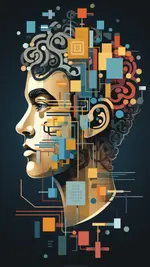Research in the Field of Applied Computer Science
The research activities in Applied Computer Science primarily address the use of Computer Science in innovative applications particularly related to the humanities, as well as the IT-based methods and principles essential to this field.

AI Systems Engineering
The research activities of the AISE Chair lie at the intersection of artificial intelligence, philosophy, mathematics, computer science and natural language. Current research of the team focuses on mechanising formal reasoning and explanation in the computer to develop trustworthy AI systems. A particular interest is the use of classical higher order logic (HOL) as a universal meta-logic to automate various non-classical logics and use them in current applications, including machine ethics and machine law, metaphysics (e.g. Gödel's ontological argument), mathematical foundations (e.g. category theory) and rational argumentation. However, the research activities of the AISE team are more far-reaching, and also deal, for example, with the integration of automated reasoning, machine learning and agent-based architectures. Prof. Dr. Benzmüller's core competences are in the area of classical higher order logic (HOL), to whose semantics and proof theory he has contributed. Together with colleagues and students, he has also developed the Leo Theorem Prover for HOL.
Applied Computer Science in the Cultural Sciences
The research projects deal with matters pertaining to Computing in the Cultural Sciences, i.e., computer science in the humanities. The research group develops, for example, information systems for architectural heritage conservation, human geography or communication studies.
Semantic information processing systems, which are continually being refined, represent the foundation of this work. The focus of this research is placed on the following technological fields:
- Geoinformation Systems and Services
- Digital Libraries and Archives
- Mobile Assistance Systems
- Computer-mediated Communication
Cognitive Systems
The field of Cognitive Systems in Applied Computer Science deals first and foremost with learning. The aim of machine learning is to develop software that enables computers to acquire new knowledge or more general capabilities from particular and exemplary experience.
Machine learning research is focused on improving existing learning algorithms or developing new ones, with the aim of creating programs that replicate human learning processes.
Machine learning makes it possible to utilize in computer programs knowledge and capabilities for which no explicit model can be specified. This can be applied, for example, to computer-aided diagnostics, the detection of patterns in large volumes of data (data mining) or to the development of user-adaptive systems.

Computer Graphics and its Foundations
Technological advances in computer graphics are impressive. Virtual reality has reached the consumer market, AI-driven virtual assistants have become more common, and we can create worlds and characters that can barely be distinguished from reality. However, creating virtual characters and worlds is cumbersome and using virtual reality is often still uncomfortable. Our research focuses on character animation, motion perception, and virtual and augmented reality.
- Interaction in virtual reality and with augmented reality. How can we best interact and communicate in virtual worlds in real time? How can we use these technologies to convey knowledge, create experiences, and answer questions?
- Motion synthesis for virtual characters: We research new data-driven animation algorithms, for example, to create or complete motions, that can not be captured accurately. To this aim, we use motion capture and neural networks.
- Perception of virtual humans. Humans are capable of successfully recognizing and interpreting small details in other's motions. We aim to determine which components of human motion are crucial when animating virtual characters.

Explainable Machine Learning
The chair's research focuses on the development of robust, data-efficient machine learning methods with versatile applications in industry and especially in healthcare. It is guided by the idea of making a positive contribution to society and patients.
- Basics: Further development of Neural Networks (Deep Learning) with a focus on robustness and interpretability.
- Application: Quantitative image analysis based on classification, segmentation and localisation including uncertainty estimation.
- Impact: Translation and integration of research results in close collaboration with partners from industry and the healthcare sector

Fundamentals of Natural Language Processing
The chair works on processing natural language in written form, that means, we perform research to enable computers to understand language (natural language understanding) and also to generate language (natural language generation). We cover all steps in this research and development process, including
- Resource Development (we need data that exemplify the phenomena we want to model)
- Modeling (we develop machine learning models, often based on deep learning, probabilistic methods, or large language models), which learn from these data
- Application (we apply the systems we develop across various areas to understand their limitations and help other areas to benefit from the value of such systems)
Human-Computer Interaction
The three vital developments of human-computer interaction (HCI) play a major role in research: interactive systems (with graphic interfaces and windows-based user interaction); cooperative systems (for computer-aided communication and cooperation); and ubiquitous systems (for natural user interaction with the help of sensors and actuators of finger movements, speech input, etc.). Research work is conducted primarily in the following fields:
- The fundamentals: methodological, conceptual and technological foundations for the development of these systems
- Contextual support: sensors for the capture of information; information presentation indicators; information and context modeling
- Innovative user interfaces: the conceptual design and evaluation of mobile and web-based user interfaces, as well as ambient interfaces which utilize users’ physical surroundings to display digital information.

Information Visualization
Information visualization is a mediator between humans and machines – it makes machine data readable for humans and provides an interface to use the machine. In this role, the discipline integrates various computer science techniques, in addition to its own contributions, and makes them available. The research group carries out basic research developing new visualization techniques and investigates interactive visual analysis systems for various disciplines. Good usability and comprehensibility of the visualizations as well as transparency of data processing are always taken into account. The research of the group splits into the following areas:
- Expressive Visual Encodings: Meaningful visualization of complex and dynamic processes and behavior patterns.
- Explanatory Visual Reporting: Explanatory combinations of text or speech and visualization, where both media merge through seamless integration.
- Enabling Visual Analytics: Analysis methods that enable conclusions to be drawn through comparative presentation as well as interactive editing and abstraction.
Media Informatics
The focal areas of Media Informatics research are context-related information retrieval, content-based retrieval in distributed environments, search engines for internet and intranet applications, content-based image retrieval, blended learning and e-learning applications, and infrastructures and applications for digital humanities.

Multimodal Intelligent Interaction
The areas of research at the group include intelligent systems, cooperation between robots and humans, the handling of complex tasks, and joint action scenarios.
An intelligent system must be able to understand and solve complex tasks if it is to interact autonomously with its environment. This poses a number of challenges: unstructured environments require flexible solutions in order to be able to react to external factors. In addition, tasks can usually be solved in different ways and must be adapted to the capabilities of the system. Ambiguities in the interaction with users result in unclear instructions that need to be supplemented to be fully understood, e.g., from the context. In addition to the need for anticipating human behavior and supporting a variety of modalities, commonsense and domain knowledge must also be represented. The combination of symbolic and subsymbolic AI in a hybrid approach is central to this. Furthermore, social aspects must also be taken into account in this kind of interaction with users.

Natural Language Generation and Dialogue Systems
The Natural Language Generation and Dialogue Systems group conducts research in the area of Conversational AI on the naturalness of speech-based human-machine interaction. The focus is on technology research and the question of what behaviour is perceived as natural by humans. The group's research addresses the following questions: how to realise natural interaction from a technical point of view , which properties, which abilities must a system have to act in a natural manner, and which factors make the behaviour of such a system to be perceived as natural? To achieve this, Large Language Models are combined with classical dialogue management technology, explainable reinforcement learning as well as active and weakly supervised learning.

Smart Environments
Research in the area of Smart Environments contributes to the university-wide research focus on human-centred artificial intelligence (AI) by exploring AI techniques for interactive and context-sensitive applications. The processing of knowledge about space and time plays a central role (knowledge representation, qualitative spatial and temporal reasoning). It is investigated how intelligent systems can acquire knowledge about their environment through learning and perception, how conclusions can be drawn efficiently from this knowledge, how it can be communicated with humans, and how such techniques can be integrated in a technical system.

User Experience and Design
Technology is no longer confined to our offices, schools and homes, but is spreading with astonishing speed into our everyday public urban landscapes. While many current urban computing systems focus primarily on increasing efficiency as well as monitoring and surveillance, the research group's fundamental research points to a much broader spectrum of urban life. By means of "research through design", we are opening up new design processes, interaction techniques and user interfaces for public urban space and analyse the resulting qualities of experience, as emotional consequences, social behaviour, spatial and pragmatic qualities, wondering, playing, lingering, ambiguity, curiosity, drama, doubt and beauty enrich our urban space just as much as the need for efficiency.
In brief, the research focuses on the following fields of technology:
Interaction Design, Interface Design, Media Architecture, Tangible, Embedded and Embodied Interaction, Urban HCI, Urban Technology, Physical Computing, Prototyping



